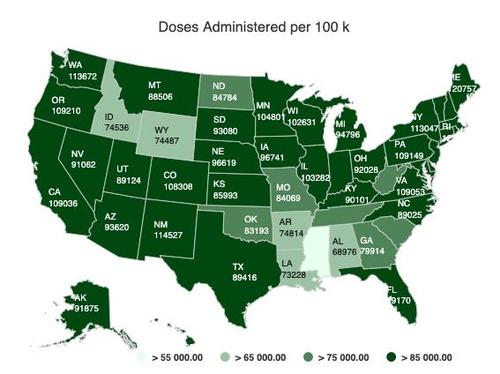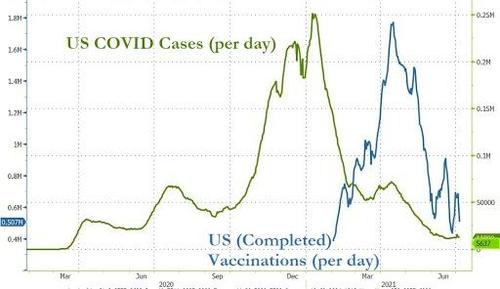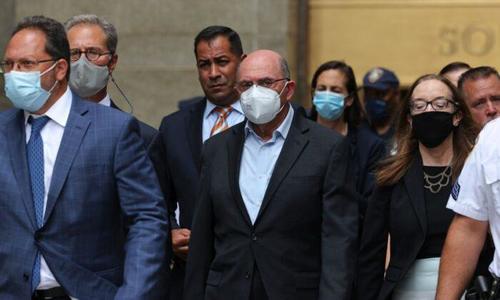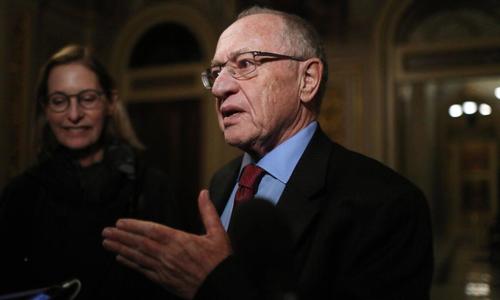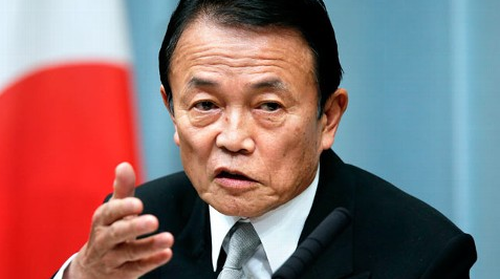Authored by Aaron Maté via TheGrayZone.com,
Facing growing outcry, OPCW Director General Fernando Arias went before the UN and told new falsehoods about his organization’s Syria cover-up scandal – along with more disingenuous excuses to avoid addressing it.
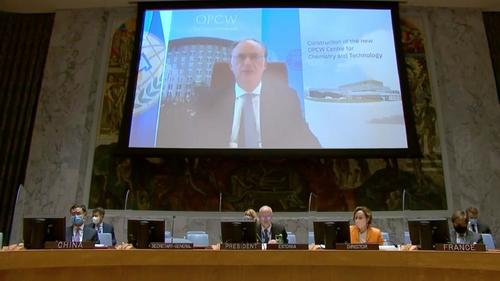
Part 1 of 2…
In the two years since the censorship of a Syria chemical weapons investigation was exposed, the head of the Organization for the Prohibition of Chemical Weapons (OPCW), Fernando Arias, has vigorously resisted accountability.
Arias has refused to investigate or explain the extensive manipulation of the OPCW’s probe of an alleged April 2018 chlorine attack in Douma. Rather than answer calls to meet with the veteran inspectors who protested the deception, Arias has disparaged them. The OPCW Director General (DG) has even resorted to feigning ignorance about the scandal, recently claiming that “I don’t know why” the organization’s final report on Douma “was contested.”
Facing growing pressure to address the cover-up – most prominently in a “Statement of Concern” from 28 notable signatories, including five former senior OPCW officials – Arias came before the United Nations Security Council on June 3rd to answer questions in open session for the first time.
In a nod to the public outcry, Arias backtracked from a previous statement that the Douma controversy could not be revisited. But while appearing to suggest that the investigation could be reopened, Arias offered more falsehoods about the scandal, and new disingenuous excuses to avoid addressing it.
This two-part report summarizes Arias’ latest evasions and distortions, which include the following:
-
Rejecting proposals for resolving the Douma controvery, Arias invoked restrictions that do not appear to exist. Arias falsely claimed that the OPCW’s Scientific Advisory Board (SAB) has “no authority” to examine the suppressed Douma evidence. Arias also claimed that he personally has “no authority whatsoever to reopen this investigation,” even though the OPCW’s regulations contain no such limits.
-
To discredit the vast quantity of work that was done for the investigation’s original report, which found no evidence of a chlorine attack, Arias falsely stated that the “bulk” of analysis was conducted after its chief author was no longer involved. To advance this falsehood, Arias cited a fabricated figure.
-
Arias tacitly retracted a previous false claim that no state has challenged the Douma report’s conclusions. But instead of acknowledging that prior falsehood, he replaced it with a new one.
-
Arias did not answer direct questions about the documented scientific fraud in the Douma probe, and how he plans to address it. The DG ignored a question from the Russian delegation about why the Final Report omitted the conclusions of NATO member state toxicologists who ruled out chlorine gas as the cause of death. And for the third time, Arias did not respond to a question asking whether he will agree to meet with the dissenting inspectors.
-
A recent BBC podcast interviewed a purported OPCW source who discussed sensitive information and criticized the Douma whistleblowers, as well as the organization’s first Director General, José Bustani. Arias offered an absurd excuse to avoid launching an investigation, stating that he would only probe the breach of confidentiality if the BBC’s source “is identified.”
-
Arias continued to deceptively minimize the role of the key dissenting inspector, Dr. Brendan Whelan. Arias downplayed the fact that Whelan was the scientific coordinator and chief author of the team’s original report, and falsely claimed that he was only involved “in a limited capacity.”
-
Arias also continued to falsely downplay the role of the second known whistleblower, Ian Henderson. Arias’ latest distortions about Whelan and Henderson are addressed in the second part of this report.
Arias’ UN appearance was the latest chapter in a saga that has upended the world’s chemical weapons watchdog. In April 2018, the US, UK and France bombed Syria after accusing its government of committing a chemical attack in Douma. In March 2019, the OPCW released a final report that aligned with the US narrative that Syria was guilty of dropping chlorine gas cylinders on a pair of apartment buildings, including one where dozens of dead bodies were filmed. But an extraordinary trove of leaks soon exposed that the OPCW had published a whitewash.
Internal OPCW documents showed that the inspectors who investigated the Douma incident had found no evidence of a chemical weapons attack. The files also revealed gross inconsistencies in the prevailing narrative that chlorine was the cause of death. These findings, if released, would have reinforced strong indications that extremist insurgents who controlled Douma had staged the incident, just as Syrian forces were set to retake control. But the Douma evidence was concealed in a multi-stage cover-up.
Unknown senior OPCW officials were caught trying to doctor the team’s original report to falsely suggest evidence of a chemical attack. A delegation of US officials also visited the Hague and, in a highly irregular move, tried to convince the team that chlorine gas was used by the Syrian government. The bulk of the original team who deployed in Douma was sidelined, replaced by officials who, for the most part, had not even set foot in Syria. The result was a deceptive final report that erased the key findings of the censored original.
Although the OPCW leaks first surfaced in May 2019, Arias did not face direct questioning about the controversy until December of last year, when he came before the United Nations Security Council. However, Arias refused to answer in open session, and reportedly gave vague, non-substantive answers in private.
The Director General’s decision to return to the UN to answer questions in open session followed growing public pressure, led by former senior UN official Hans von Sponeck, as well as Bustani, the former OPCW chief. Arias’ reliance on falsehoods and hollow excuses offered the most stark display yet that his handling of the Douma cover-up cannot be defended in good faith.
OPCW chief falsely claims “no authority whatsoever” to address Douma cover-up
Just weeks before his UN appearance, Arias told the European Parliament on April 14th that when it comes to the OPCW’s Douma scandal, “the matter is closed.”
But when he came before the UN Security Council on June 3rd, Arias changed his tune. Rather than personally closing the door on revisiting the probe, Arias now claimed that he does not have the authority to re-open it. Arias did so by citing OPCW rules and restrictions that do not appear to exist.
Arias’ fallacious excuse came in response to a new proposal to break the impasse. In April, the Berlin Group 21 – established by former UN assistant secretary general Hans von Sponeck, former OPCW chief Jose Bustani and Richard Falk, an eminent Princeton Law Professor – put forward a way to address the dispute over the Douma report. They urged Arias to allow the OPCW’s own Scientific Advisory Board (SAB) — a subsidiary body made up of 25 independent scientific and technical experts who serve in their personal capacities — to assess the claims of the dissenting inspectors.
“The SAB possesses the necessary scientific and technical expertise,” the Berlin Group 21 statement said. “[We] believe that leaving the scientific debate to the scientists, who best understand the issues at hand, would provide a more objective and rational approach to begin resolving this unfortunate and highly damaging controversy that surrounds the OPCW and indirectly endangers global security by eroding confidence in future findings relevant to alleged uses of chemical weapons.”
At the UN Security Council, Arias rejected this proposal, claiming that his hands are tied by the OPCW’s own regulations:
The goal of the Scientific Advisory Board is written, in the terms of reference, is to enable the Director-General to render specialized advice in connection with very sophisticated, very complicated matters and issues related to chemicals and chemical weapons. Which means that the SAB has no role to assess the findings of the FFM. The FFM is entrusted to investigate and activate an investigation to produce a report. And this report—I sign the report, I don’t touch it—it goes directly to the policymaking organs, in this case the Executive Council. Which means that the SAB has no authority to reassess the investigation of the FFM or to assess any opinion of the inspectors produced on a personal basis.
In claiming that the SAB “has no authority to reassess” the Douma FFM’s findings, Arias is invoking a restriction that does not exist.
In citing the SAB’s terms of reference (ToR), Arias failed to mention that it – along with the Chemical Weapons Convention — explicitly allows for the establishment of a temporary working group of scientific experts to provide recommendations on “specific issues” – exactly as the Berlin Group 21 proposed. Paragraph 9 of the SAB’s ToR states:
In consultation with members of the [Scientific Advisory] Board, the Director-General may establish temporary working groups of scientific experts to provide recommendations within a specific time-frame on specific issues, in accordance with Article VIII, paragraph 45 of the [Chemical Weapons] Convention.
Contrary to Arias’ claim, there is nothing preventing him from convening a working group of scientific experts to review the particularly “specific issue” that is the Douma investigation – arguably the most internally contested specific issue in the OPCW’s history. Yet Arias is claiming that he is somehow hindered by regulations that, in reality, explicitly grant him the authority to do exactly what he now claims he cannot.
In stating this excuse, Arias also dismissed the work of the dissenting inspectors as having been “produced on a personal basis”, and therefore not subject to reevaluation. Yet there was nothing “personal” about the Brendan Whelan authored-original report, completed in June 2018 and reviewed and sanctioned by other inspectors, including the team leader. What remains unknown is who exactly were the senior OPCW officials who personally doctored its contents – a question that Arias has refused to investigate.
Arias also offered another hollow excuse. The OPCW chief claimed that he can no longer revisit the Douma investigation because it is no longer “in the hands” of his office, but instead the policy-making organizations of the OPCW. According to Arias, that power now lies in the hands of the Executive Council, (the rotating group of 41 member states who govern the OPCW), and the full Conference of State Parties (all OPCW member states):
I have to say that the report of the FFM directed to Douma is in the hands of the Executive Council and the Conference. The Director-General has no authority whatsoever to reopen this investigation that concluded and was reported to the Executive Council, and through the Executive Council to the Conference. The matter is in the hands of the policymaking organs and not of the Director-General. The Executive Council was already seized of the matter in March 2019.
This is the first time that the Director General has claimed that the report is out of his control, and instead “in the hands” of a higher body. In introducing this escape-hatch, Arias is now giving the appearance that in principle he no longer objects to a reopening of the investigation. In reality, he is skirting responsibility for that decision by passing it to executive bodies that have blocked any efforts to discuss the cover-up right from the start. Upon the release of the Douma final report in March 2019, the Executive Council immediately voted down a proposal to hear from all of the experts who worked on the Douma case. The US delegation lobbied to block the vote by reportedly arguing that such a hearing would be akin to “Stalinist trials.”
Contrary to Arias’ assertions, the Chemical Weapons Convention does not support his claim that once a final report is issued, it becomes “in the hands of the Executive Council and Conference.” The relevant passage of the CWC simply states that the “Director General shall promptly transmit the preliminary and final reports to the Executive Council and to all States Parties.” (Part XI of the Verification Annex to the CWC, Investigations of Alleged Uses of Chemical Weapons, Section D [Reports], paragraph 23.)
There is nothing to suggest here that the Executive Council – or the State Parties — becomes the custodian of these reports, or that the Technical Secretariat (TS), which the Director General oversees, somehow loses control over them.
This is indeed borne out by past practice. It is common for the TS to make amendments to final reports and issue them without the Executive Council’s permission. Such amendments, which are issued as official TS “Addendums” to published reports, can be minor technical or typographic corrections, but also major substantive additions.
This practice includes a previous OPCW investigation in Syria. After publishing a final report on alleged chemical attacks by insurgents in Syria in December 2015 (S/1318/2015/Rev.1), Syrian authorities invited the OPCW to return in order to collect further evidence that the report claimed was lacking. The FFM team paid a second visit to Syria one month later and published an Addendum to the final report — with details of its additional deployment — in February 2016. (S/1318/2015/Rev.1/Add.1).
The Addendum contains no mention of the Executive Council, and there is no record of any EC vote to authorize it. The opening paragraph reads:
This addendum provides information further to “The Report of the OPCW Fact-Finding Mission in Syria Regarding the Incidents Described in Communications from the Deputy Minister for Foreign Affairs and Expatriates and Head of the National Authority of the Syrian Arab Republic” (S/1318/2015/Rev.1, dated 17 December 2015’).
In the case of Douma, no one is even proposing that the OPCW return to Syria, as it did after issuing that final report of December 2015. The OPCW is simply being asked to hear from the Douma probe’s own inspectors, and address their complaints, including the doctoring of the mission’s original report. Arias is passing the buck to a concocted higher authority in order to avoid exercising his own.
Disparaging whistleblowers, OPCW chief cites a fabricated figure
In one of his few attempts to make a substantive claim in defense of the Douma investigation, OPCW Director General Ferando Arias has repeatedly asserted that “most of the analytical work took place” in the last six or seven months, when the dissenting inspectors were no longer part of the Douma Fact-Finding Mission (FFM). Because of this, Arias has claimed that the whistleblowers “had manifestly incomplete information on the Douma investigation,” rendering their protests “egregious.”
At the UN Security Council, Arias doubled down on this argument by adducing, for the first time, a purported figure to substantiate it. According to Arias, 70 samples were analyzed by the OPCW in the last six months of the investigation, when the dissenting inspectors were no longer involved. Arias made this claim twice:
The FFM, after Inspector B departed, worked for more than six months, during which the bulk of the results of the investigation was got by the team. For instance, out of the more than 100 samples, around more than 70 results were brought in those last six months of the investigation.
…Of course, the bulk of the investigations related to Douma came after I arrived to the Organisation after July 2018. Of the more than 100 samples, more than 70 good samples were analyzed after the summer of 2018. The bulk of the investigation, the bulk of information, the bulk of analysis, of all the information that had been gathered came after the two inspectors left.”
Arias’ claim that “more than 70” samples “were analyzed after the summer of 2018” in the “last six months of the investigation” is a demonstrable falsehood. Unless the OPCW somehow failed to report dozens of analyzed samples until now, the claim of 70 samples is a fabricated figure. In reality, the final report on Douma shows that just 44 samples were analyzed throughout the entire probe. And just 13 of those samples were analyzed after the issuing of the interim report — i.e., after the dissenting inspectors were out of the picture.
With just 44 samples analyzed for the entire probe, and just 13 new samples analyzed in the final six months, this means that 70% of the Douma investigation’s total sample analysis was in fact conducted in its first month.
Completely inverting that reality, Arias has now produced a phony figure that paints a false picture of the work conducted in the six months after the dissenting inspectors were sidelined.
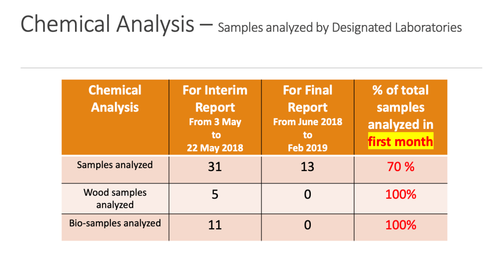
According to the Final Report, 70% of the total chemical samples analyzed were analyzed in the probe’s first month. Just 13 samples were analyzed in the last seven months, undermining OPCW DG Arias’ new claim that 70 samples were analyzed in that period. (Excerpt of Aaron Maté’s UN presentation, April 16 2021)
By claiming that the “bulk of the investigation” was conducted after the whistleblowers were no longer involved, Arias is also erasing other critical areas of work conducted in the first two months and included in the suppressed original report.
As I recently detailed in a UN presentation, a comparison between the interim report of July 2018 and the final report of March 2019 shows that the vast majority of the investigation was already done in the first two months in multiple key areas: 100% of the research of the scientific literature; 87% of the total interviews had been conducted and analyzed; a meeting with four NATO toxicologists had been convened, and 98.5% of the metadata analysis of media files from Douma was undertaken. In addition, a complete epidemiological study was reported in the original report, much of which was expunged from the final report.
This means that, contrary to Arias’ claim, the bulk of the work was in fact carried out in the probe’s first two months.
Retracting one falsehood, Arias replaces it with another
At the European Parliament in April, Arias falsely claimed that no state party has challenged any of the Douma report’s conclusions, and that Russia even “agrees” with them:
The conclusions of the report, paradoxically, have never been disputed by a state party. Even the Russian delegation agrees with the conclusions.
Arias’ implausible contention was that, despite the heated two-year public dispute over the Douma investigation, no member state has challenged it. Yet Syria and Russia have vigorously challenged the report’s findings, within the OPCW itself and in a series of UN Security Council debates.
As The Grayzone has previously reported, this phony talking point was first put forward by the NATO-tied website Bellingcat last year. Bellingcat produced excerpts of a letter that it claimed was sent by Arias in June 2019 to Dr. Brendan Whelan, the key dissenting inspector. This letter, Bellingcat declared, “reveals that at a diplomatic level behind closed doors, the Russian and Syrian governments have both agreed with the conclusions of the OPCW report.”
But The Grayzone then revealed that not only was this claim ludicrous, but based on a “letter” that was never actually sent. The Grayzone obtained and published Arias’ actual letter to Whelan, which contained none of Bellingcat’s text.
In a sign that he has now recognized the fallacy of the Bellingcat-promoted talking point, Arias tacitly walked it back in his June 3rd UN appearance. But instead of acknowledging his previous error, he replaced it with a new one. Arias now claimed:
None of the 193 Member States of the OPCW have challenged the findings of the FFM that chlorine was found on the scene of the attack, in Douma.
To support his claim about chlorine found at the scene, Arias cited a note verbal (diplomatic correspondence) from Russia:
I have here in front of me a note verbal of the Russian Embassy, dated the 26th of April 2019, note #759 that includes an attachment. It’s a Russian Federation paper, based on the conclusions of the report of the FFM in Douma. And this note required me to disseminate this report. This note, or report attached to the note by the Russian Embassy in The Hague said, “Conclusion. The Russian Federation does not challenge the findings contained in the FFM report regarding the possible presence of molecular chlorine in the cylinders, etc.” This is on the web page from the Organisation.
Arias’ own source undermines his claim. Whereas Arias told the UN that no state has “challenged the findings of the FFM that chlorine was found on the scene,” his evidence for that statement – a Russian note verbal – simply states that Russia “does not challenge” that there was a “possible presence of molecular chlorine in the cylinders.”
The Russian correspondence goes on to explain why it explicitly does challenge the final report’s conclusion that chlorine was likely used as a chemical weapon. Responding to Arias at the UN, Russian Ambassador Vasily Nebenzya read the relevant passage in full:
The Russian Federation does not challenge the findings contained in the FFM report regarding the possible presence of molecular chlorine on the cylinders. However, the parameters, characteristics and exterior of the cylinders, as well as the data obtained from the locations of those incidents, are not consistent with the argument that they were dropped from an aircraft. The existing facts more likely indicate that there is a high probability that both cylinders were placed at Locations 2 and 4 manually rather than dropped from an aircraft. Apparently the factual material contained in the report does not allow us to draw a conclusion as to the use of a toxic chemical as a weapon. On that basis, the Russian Federation insists on the version that there was false evidence and on the staged character of the incident in Douma.
Therefore, the only contention that Russia did not challenge is that of a “possible” presence of molecular chlorine in the cylinders found in Douma. That is for obvious reasons.
No one has argued that there was no possibility of a chlorine presence. There were, after all, two chlorine cylinders found at the scene, so traces of chlorine could be expected. In reality, the OPCW did not even report any finding of chlorine gas on the cylinder. They found chloride, a breakdown product of chlorine gas but also a very common substance in the environment, and in household products like table salt and other chloride salts. Chloride theoretically could have been dispersed around the cylinders.
Other possible evidence of chlorine gas use came from very low traces of various chlorine-containing organic compounds (CLOCs) found at the scene — most, if not all, of which can be present in the environment. Because the OPCW failed to test background samples – an oversight or deliberate omission that Whelan later described as scientifically indefensible – it could not determine if these trace quantities of CLOCs found at the scene pointed to chlorine gas use, or if they came from benign sources.
When challenged at the UN on his misrepresentation of the Russian note verbal, Arias did not offer a rebuttal. He instead tersely stated: “The Russian note verbale is published and that is what they have to say.”
Arias’ willingness to deceive the UN on the details of the Douma probe and the OPCW’s own capacity to address it also extends to his portrayal of the whistleblowers, as we will explain in detail in the second part of this report.





